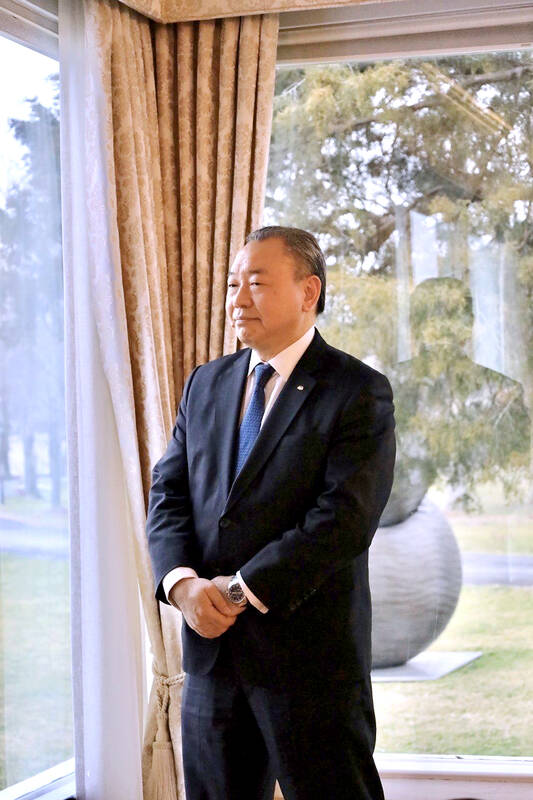Representative to the US Alexander Yui’s use of diplomatic funds to overhaul his official residence followed the law and regulations, and no irregularities have been found, the Ministry of Foreign Affairs said yesterday.
The funds were spent to replace old furniture, appliances and supplies in the envoy’s official Washington residence, ministry spokesman Jeff Liu (劉永健) told reporters in Taipei.
The refurbishment was necessary because the office is often used to host official banquets and other important events that involve guests, Liu said.

Photo courtesy of the Taipei Economic and Cultural Representative Office in the US
Liu would not disclose how much was spent on the project, saying he did not have specific details.
The Chinese-language Mirror Magazine yesterday reported that Yui spent about NT$8 million (US$246,586) to overhaul the residence since taking up the envoy post late last year.
Most of the money was spent on high-end sofas, beds and carpets, the magazine quoted a diplomatic source as saying.
The source, who spoke on condition of anonymity, told the magazine that Yui used taxpayers’ money to buy luxurious items.
Yui had wanted to buy a Cadillac SUV worth more than NT$2 million as his official vehicle, the source said.
However, the ministry denied the request, as the existing envoy’s car was only purchased two years ago, the magazine reported.
Yui and his wife often used the official vehicle for personal reasons, and he had even asked the driver to take his family on private shopping trips, which angered many staff members in the representative office in Washington, the source said.
Liu said that the overhaul was necessary and that all purchases were made in accordance with the law.
Liu confirmed that Yui initially wanted to purchase a Cadillac as an official vehicle, but that the proposal was denied due to the existing car not reaching the required mileage and age needed to be replaced.
The ministry would look into other allegations raised in the media report, Liu added, without elaborating.
Earlier yesterday, Presidential Office spokeswoman Karen Kuo (郭雅慧) said that President William Lai (賴清德) had asked the Executive Yuan and the ministry to look into the allegations surrounding Yui and respond accordingly, also without elaborating.
Minister of Foreign Affairs Lin Chia-lung (林佳龍) told reporters on the sidelines of a Legislative Yuan meeting that there is no plan to ask Yui to return to Taiwan to explain the situation.
Lin said that he has asked Yui to file a written report explaining the spending, adding that he believes this would suffice.
So far, it appears that Yui has done everything by the book, Lin said.
However, the ministry might need to overhaul regulations relating to refurbishing overseas offices, he said.
Yui, a seasoned career diplomat, succeeded his predecessor, Vice President Hsiao Bi-khim (蕭美琴), as the nation’s de facto ambassador to the US in December last year.
Hsiao left the post and returned to Taiwan last year to be Lai’s running mate for the presidential election in January.
Yui previously served as ambassador to Paraguay from 2015 to 2018, vice foreign minister from 2021 to last year and briefly as representative to the EU and Belgium.

Chinese Nationalist Party (KMT) Chairman Eric Chu (朱立倫), spokeswoman Yang Chih-yu (楊智伃) and Legislator Hsieh Lung-chieh (謝龍介) would be summoned by police for questioning for leading an illegal assembly on Thursday evening last week, Minister of the Interior Liu Shyh-fang (劉世芳) said today. The three KMT officials led an assembly outside the Taipei City Prosecutors’ Office, a restricted area where public assembly is not allowed, protesting the questioning of several KMT staff and searches of KMT headquarters and offices in a recall petition forgery case. Chu, Yang and Hsieh are all suspected of contravening the Assembly and Parade Act (集會遊行法) by holding

PRAISE: Japanese visitor Takashi Kubota said the Taiwanese temple architecture images showcased in the AI Art Gallery were the most impressive displays he saw Taiwan does not have an official pavilion at the World Expo in Osaka, Japan, because of its diplomatic predicament, but the government-backed Tech World pavilion is drawing interest with its unique recreations of works by Taiwanese artists. The pavilion features an artificial intelligence (AI)-based art gallery showcasing works of famous Taiwanese artists from the Japanese colonial period using innovative technologies. Among its main simulated displays are Eastern gouache paintings by Chen Chin (陳進), Lin Yu-shan (林玉山) and Kuo Hsueh-hu (郭雪湖), who were the three young Taiwanese painters selected for the East Asian Painting exhibition in 1927. Gouache is a water-based

Taiwan would welcome the return of Honduras as a diplomatic ally if its next president decides to make such a move, Minister of Foreign Affairs Lin Chia-lung (林佳龍) said yesterday. “Of course, we would welcome Honduras if they want to restore diplomatic ties with Taiwan after their elections,” Lin said at a meeting of the legislature’s Foreign Affairs and National Defense Committee, when asked to comment on statements made by two of the three Honduran presidential candidates during the presidential campaign in the Central American country. Taiwan is paying close attention to the region as a whole in the wake of a

OFF-TARGET: More than 30,000 participants were expected to take part in the Games next month, but only 6,550 foreign and 19,400 Taiwanese athletes have registered Taipei city councilors yesterday blasted the organizers of next month’s World Masters Games over sudden timetable and venue changes, which they said have caused thousands of participants to back out of the international sporting event, among other organizational issues. They also cited visa delays and political interference by China as reasons many foreign athletes are requesting refunds for the event, to be held from May 17 to 30. Jointly organized by the Taipei and New Taipei City governments, the games have been rocked by numerous controversies since preparations began in 2020. Taipei City Councilor Lin Yen-feng (林延鳳) said yesterday that new measures by